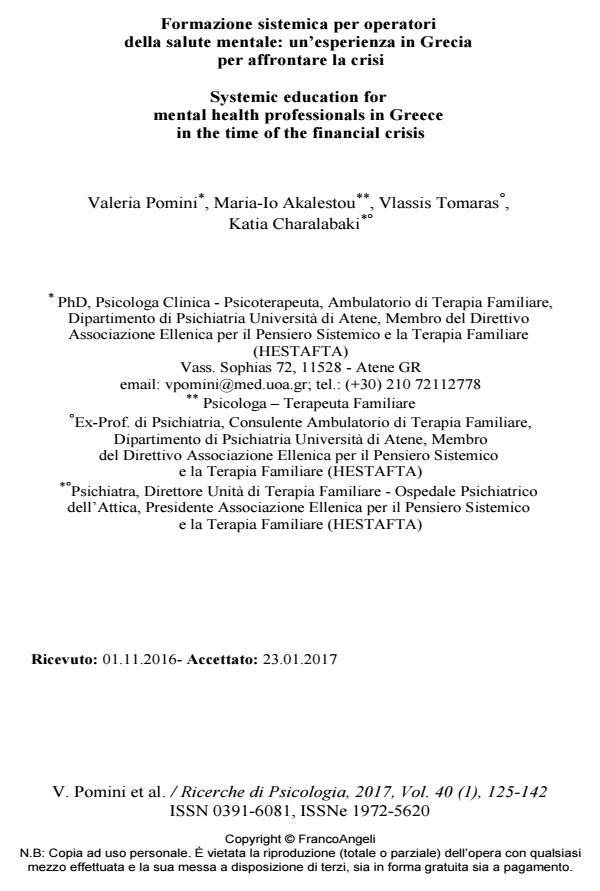Formazione sistemica per operatori della salute mentale: un’esperienza in Grecia per affrontare la crisi
Titolo Rivista RICERCHE DI PSICOLOGIA
Autori/Curatori Valeria Pomini, Maria-Io Akalestou, Vlassis Tomaras, Katia Charalabaki
Anno di pubblicazione 2017 Fascicolo 2017/1
Lingua Italiano Numero pagine 18 P. 125-142 Dimensione file 262 KB
DOI 10.3280/RIP2017-001006
Il DOI è il codice a barre della proprietà intellettuale: per saperne di più
clicca qui
Qui sotto puoi vedere in anteprima la prima pagina di questo articolo.
Se questo articolo ti interessa, lo puoi acquistare (e scaricare in formato pdf) seguendo le facili indicazioni per acquistare il download credit. Acquista Download Credits per scaricare questo Articolo in formato PDF

FrancoAngeli è membro della Publishers International Linking Association, Inc (PILA), associazione indipendente e non profit per facilitare (attraverso i servizi tecnologici implementati da CrossRef.org) l’accesso degli studiosi ai contenuti digitali nelle pubblicazioni professionali e scientifiche.
Il Programma di Formazione Permanente (PFP) "Introduzione all’approccio sistemico e agli interventi di tipo familiare nei servizi per la salute mentale" è stato realizzato nel periodo Settembre 2011 - Agosto 2014 dall’Associazione Ellenica per il Pensiero Sistemico e la Terapia Familiare (HESTAFTA) con il supporto economico della Fondazione "Stavros Niarchos" (SNF), all’interno del programma "Child Mental Health" coordinato dal Master in "International Medicine - Health Crises Management" dell’Università di Atene. I principali obiettivi del PFP comprendevano: offrire un’opportunità di formazione e supervisione ad operatori della salute mentale che lavorano nelle regioni periferiche e insulari della Grecia, dove le possibilità di formazione sono scarse o inesistenti; migliorare l’efficacia dei loro interventi, in particolare nei servizi psicosociali rivolti a bambini, adolescenti e alle loro famiglie, attraverso la formazione alle pratiche sistemiche di intervento psico-sociale; creare una rete di contatti con e fra gli operatori per facilitare la comunicazione, lo scambio di informazioni cliniche e il supporto professionale. Il periodo in cui è stato realizzato il PFP è coinciso con la crisi economica che affligge la Grecia dal 2009 e le sue gravi conseguenze, quali le forti riduzioni alla spesa pubblica e in particolare alle spese riguardanti la salute mentale, la riduzione del numero di operatori e della conseguente capacità dei servizi di assorbire la domanda di aiuto, gli aggravati e più numerosi problemi psicosociali presentati dalla popolazione come conseguenza dell’aumentato stress. Il PFP è stato costantemente monitorato nelle varie fasi di realizzazione da un programma di valutazione sia interna che esterna, utilizzando metodi sia quantitativi che qualitativi, con risultati positivi e il raggiungimento dei principali obiettivi.
Parole chiave:Formazione, terapia sistemica, operatori, servizi psicosociali, crisi economica, Grecia.
Valeria Pomini, Maria-Io Akalestou, Vlassis Tomaras, Katia Charalabaki, Formazione sistemica per operatori della salute mentale: un’esperienza in Grecia per affrontare la crisi in "RICERCHE DI PSICOLOGIA " 1/2017, pp 125-142, DOI: 10.3280/RIP2017-001006